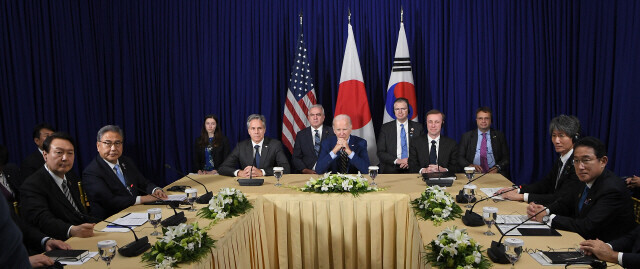hankyoreh
Links to other country sites 다른 나라 사이트 링크
[Editorial] No path forward for Korea, Japan without reflecting on past

Prime Minister Fumio Kishida of Japan will visit South Korea on May 7-8 for a summit with South Korea’s President Yoon Suk-yeol, the presidential office announced Tuesday.
In their summit, Yoon and Kishida are expected to reaffirm the commitment to improving bilateral relations expressed in their March summit and emphasize progress in trilateral cooperation with the US. Perhaps inevitably, Koreans are watching to see whether Kishida will once again remain silent about the two countries’ historical disputes, thumbing his nose at Korean public opinion.
Kishida’s visit shows that “shuttle diplomacy” — the practice of South Korean and Japanese leaders trading visits to each other’s countries — has been fully restored after a hiatus of 12 years.
After a long chill, bilateral relations between the two countries appear to be rapidly improving since Yoon’s inauguration as president. That’s because Yoon has accepted all of Japan’s demands, ignoring the basic principles of the historical disputes that are at the foundation of Korea-Japan relations.
“Japan has transformed from a militaristic aggressor of the past into a partner that shares the same universal values with us. Today Korea and Japan cooperate on issues of security and economy. We also work together to cope with global challenges,” Yoon said in a speech commemorating the March 1 Independence Movement.
Then on March 6, the Korean government announced its roundabout plan to compensate the victims of forced labor during the Japanese colonial period. Under that plan, a foundation managed by the Korean government would pay the victims, while giving Japan a free pass.
Yoon’s visit to Japan took place shortly thereafter.
Though Kishida had initially been expected to pay a return visit to Korea this summer, his visit was apparently moved up in light of developments in trilateral security cooperation between Korea, the US and Japan.
A trilateral summit is scheduled to be held on the sidelines of the Group of Seven summit in Hiroshima, Japan, on May 19-21.
At their summit, the three leaders are expected to discuss such matters as intelligence sharing on North Korea’s nuclear weapon and missile programs, security cooperation, supply chains and cooperation on cutting-edge technology.
As the US seeks to curb the rise of China, it has been working to augment trilateral security cooperation with South Korea and Japan to strengthen the ties between its two key Asian allies.
While the focus on trilateral cooperation with the US has helped improve Korea-Japan relations, their reconciliation does not rest on a solid foundation.
Even after Korea absolved Japan of responsibility for the forced labor issue, Kishida declined to express keen remorse and a heartfelt apology and simply stated that he would uphold the statements made by previous prime ministers.
Most seriously, Yoon’s diplomacy with Japan is guided by a blinkered view of history, as indicated by his remarks in a recent interview with the Washington Post. “I can’t accept the notion that because of what happened 100 years ago, something is absolutely impossible [to do] and that they [Japanese] must kneel [for forgiveness],” he said.
We hope that Kishida will respond to the Korean public’s desire for Japan to show true remorse before the two countries move forward together. That’s the best way to make meaningful progress in developing their bilateral relations.
Please direct questions or comments to [english@hani.co.kr]

Editorial・opinion
![[Column] Season 2 of special prosecutor probe may be coming to Korea soon [Column] Season 2 of special prosecutor probe may be coming to Korea soon](https://flexible.img.hani.co.kr/flexible/normal/500/300/imgdb/original/2024/0426/3317141030699447.jpg) [Column] Season 2 of special prosecutor probe may be coming to Korea soon
[Column] Season 2 of special prosecutor probe may be coming to Korea soon![[Column] Park Geun-hye déjà vu in Yoon Suk-yeol [Column] Park Geun-hye déjà vu in Yoon Suk-yeol](https://flexible.img.hani.co.kr/flexible/normal/500/300/imgdb/original/2024/0424/651713945113788.jpg) [Column] Park Geun-hye déjà vu in Yoon Suk-yeol
[Column] Park Geun-hye déjà vu in Yoon Suk-yeol- [Editorial] New weight of N. Korea’s nuclear threats makes dialogue all the more urgent
- [Guest essay] The real reason Korea’s new right wants to dub Rhee a founding father
- [Column] ‘Choson’: Is it time we start referring to N. Korea in its own terms?
- [Editorial] Japan’s rewriting of history with Korea has gone too far
- [Column] The president’s questionable capacity for dialogue
- [Column] Are chaebol firms just pizza pies for families to divvy up as they please?
- [Column] Has Korea, too, crossed the Rubicon on China?
- [Correspondent’s column] In Japan’s alliance with US, echoes of its past alliances with UK
Most viewed articles
- 1‘We must say no’: Seoul defense chief on Korean, USFK involvement in hypothetical Taiwan crisis
- 2After election rout, Yoon’s left with 3 choices for dealing with the opposition
- 3Why Kim Jong-un is scrapping the term ‘Day of the Sun’ and toning down fanfare for predecessors
- 4AI is catching up with humans at a ‘shocking’ rate
- 5[Editorial] Korea’s surprise Q1 growth requires objective assessment, not blind fanfare
- 6Noting shared ‘values,’ Korea hints at passport-free travel with Japan
- 7Two factors that’ll decide if Korea’s economy keeps on its upward trend
- 8Gangnam murderer says he killed “because women have always ignored me”
- 9South Korea officially an aged society just 17 years after becoming aging society
- 10The dream K-drama boyfriend stealing hearts and screens in Japan